A
better way than violence
Churches
in the Pacific have pledged to work together to overcome violence in
their communities, The pledge was made at the 11-18 September Pacific
Conference of Churches (PCC) assembly in Rarotonga, Cook Islands; at
the assembly, World Council of Churches’ (WCC) member churches
in the Pacific launched the Decade to Overcome Violence in their region.
Referring to the gospel vision of peace as a source of hope for change,
Archbishop Sir Ellison Pogo of Melanesia said: “Christ has shown
us a better way than violence.” Delegates spoke of the violence
of armed conflict in the Pacific, the intrusion of transnational corporations
acquiring national resources and distorting national economies, as well
as of many forms of violence in local communities and families.
The churches promised to ask themselves how far their own words and
deeds increase the potential of violence; set up signs for non-violent
ways of living together in congregations, movements and groups; try
methods of non-violent conflict resolution; and work.
Special
Commission report provokes lively debate
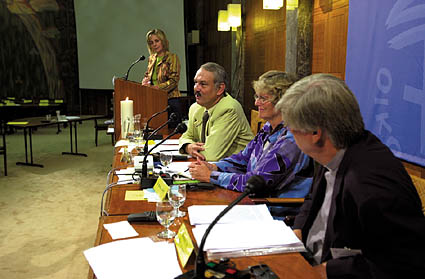
From right
to left: Special Commission co-moderator, Bishop Rolf Koppe of the
Department of Ecumenical Affairs and Ministries Abroad of the Evangelical
Church in Germany (EKD), past moderator of the United Church of
Canada Marion Best, WCC deputy general secretary Georges Lemopoulos
and Karin Achtelstetter, WCC media relations officer, at a press
conference following discussion in central committee on the Special
Commission report. |
The
report of the Special Commission on Orthodox Participation in
the World Council of Churches (WCC) provoked lively debate on
29 August and 3 September during a meeting of the WCC central
committee in Geneva.
The debate focused mainly on distinctions between confessional
and interconfessional “common prayer”. The report
recommended, inter alia, that planners of common prayer attempt
to be sensitive to issues which might be difficult for some participants.
One such concern is the leadership of women. |
The report suggested that “planners should refrain from
taking a confrontational stance on the question of ordination
of women by implying that the current practice of a particular
church is the only possible Christian position on the issue”.
Orthodox and some Protestant churches do not ordain women.
Recognizing
the weight of the argument that “if we cannot pray together,
we cannot stay together”, and the value of common prayer
“in situations of courage, renewal and inspiration”,
the central committee “received” the recommended proposal
for common prayer as a “framework document” and commended
it for consideration at WCC gatherings.
The question of whether to replace voting with consensus as a
method of decision-making at WCC meetings also provoked debate
at the meeting. Some supported consensus as an opportunity for
all perspectives to be heard and a common mind to be reached in
a prayerful spirit. Others feared that small minorities could
block timely and prophetic action by the WCC. The central committee
agreed to test the process of consensus at its next two meetings
in 2003 and 2005, work out appropriate procedures, and report
to the WCC’s ninth assembly in 2006.
As recommended by the Special Commission, the central committee
approved the establishment of a permanent committee on consensus
and collaboration as an advisory body. Among the issues already
referred to this committee are matters relating to “common
prayer”, including its ecclesial nature, and the development
of the life of common prayer within the fellowship of the WCC.
The central committee also approved revisions to WCC membership
categories, which will now include member churches and “churches
in association with the WCC”.
The Special Commission was created by the WCC’s eighth assembly
in Harare, Zimbabwe, in 1998, notably because of a perception
that the “structure, style and ethos” of the WCC was
making meaningful Orthodox participation increasingly difficult.
The Commission’s final report noted that “strongly
held convictions have been vigorously defended” during its
deliberations, but affirmed that “the whole engagement has
been characterized by a deep respect for one another’s spiritualities
and a genuine desire to understand and to accommodate differences
of confessional outlook”. |

Solidarity
for Palestinian Christians
Christians
all over the world have been called to support and be in solidarity
with Arab, and particularly Palestinian, Christians. This call has come
from World Council of Churches (WCC) central committee member Dr Bernice
Powell Jackson, who visited Palestine and Israel in August 2002.
Interviewed
by WCC
News on 28 August, Powell Jackson explained that this had
been her third visit to the region in the past 18 months. She represented
the WCC in a multifaith delegation led by Rev. Jesse Jackson at the
invitation of the Middle East Council of Churches and the Palestinian
Authority.
"Our
aim was to encourage both Israelis and Palestinians to use non-violent
means to solve their conflict," she said. Summarizing the views
of the Muslim and Christian leaders they met, "both sides agreed
that military means would not provide a solution, and want to end the
current cycle of violence," she reported.
Palestinian
Christians feel "isolated and forgotten", Powell Jackson emphasized.
The conflict, the killings and the physical destruction of property
have created despair. "That despair must be replaced with hope,"
and this requires a new approach of non-violence.
Powell
Jackson is executive minister for Justice and Witness Ministries, a
covenanted ministry of the United Church of Christ in the United States.
She stressed the need for support by international communities committed
to a non-violent approach. "Christians share a specific challenge
to assure Palestinian Christians and other Christians in the region
that they have not been forgotten."
See
also information on the Ecumenical
Accompaniment Programme (EAPPI) in Palestine and Israel, with reports
from the first group of ecumenical accompaniers.

PEOPLE:
In Memoriam
Alan
Brash (1913-2002)
After a long and fulfilling ecumenical life, Rev. Dr Alan Brash
died on 24 August at his home in Christchurch, Aotearoa-New Zealand,
at the age of 89. Having served the World Council of Churches (WCC)
as director of Interchurch Aid, Refugee and World Service (1970-74),
he was deputy general secretary of the WCC and staff moderator of
the-then Unit II for four years from 1974. Upon retirement, Brash
was elected moderator of the Presbyterian Church of New Zealand,
and later returned to the national council of churches to become
its first regional secretary in Auckland. |
Augustina
Lumentut (1937-2002)
A staff member of the Council of Churches of Central and Northern
Celebes, Indonesia, Rev. Augustina Lumentut died after a short illness
on 21 August. Lumentut was elected to the World Council of Churches’
(WCC) central committee at the WCC’s 1983 Vancouver assembly.
She is described by Margaret Kirk in Let Justice Flow as an Asian
woman who has worked creatively for the liberation of her people
in a period of high Christian-Muslim tensions and persecution. |
Keith
R. Bridston (1924-2002)
An outstanding author and former director of the WCC’s New
York office, Dr Keith R. Bridston passed away on 27 July in Tucson,
USA. A professor of systematic theology at the Theological Seminary
in Berkeley, California (1963-78), Bridston had served earlier as
secretary of the World Student Christian Federation in Geneva, and
as director of the WCC’s Faith and Order commission. He also
taught at Nommensen University in Sumatra, where he doubled as Lutheran
World Federation representative. His books include Theological Training
in the Modern World; Mission, Myth and Reality; and Church Politics:
The Making of Ministers. |
Lee
Oo-Chung (1923-2002)
The South Korean Christian community lost a gifted leader with the
passing away of Ms Lee Oo-Chung on 30 May at the age of 79. Lee’s
leadership qualities were evident in her work as president of Korea
Church Women United, president of the Korean Association of Women
Theologians, and in her own church – the Presbyterian Church
in the Republic of Korea (PROK) – where she presided over
the National Church Women’s Association. Between 1953 and
1981, Lee taught theology at Hanshin University and Korea Women’s
University and, in l997, founded the Women Making Peace movement.
During the era of military dictatorship in her country, she was
active as a pro-democracy and human rights campaigner. |
Stephen
Weagba Muin, Jr (1947-2002)
A former general secretary of the Liberian Council of Churches,
Rev. Steven Weagba Muin died on 14 August in Monrovia, Liberia.
He once served as Africa regional secretary of the World Student
Christian Federation. |
Patrick
Campbell Rodger (1920-2002)
Acclaimed as an early advocate of women’s ordination in the
Anglican church, Rev. Patrick Campbell Rodger passed away on 8 July
at the age of 81. Among the highlights of his service to his church
was his tenure, for eight years from 1970, as bishop of Manchester
and then, from 1978 to 1986, of Oxford. Earlier, in 1961, he served
as executive secretary of the WCC Faith and Order commission, a
post he held up to 1966. Rodger also served as honorary assistant
bishop of Edinburgh for 14 years until his final retirement in 2000.
|
PEOPLE:
New Staff
Cluster
on Communication
Juan Carlos Michel, from Buenos Aires, Argentina,
has been appointed media relations officer. Michel is secretary
of communication and publications of the Evangelical Church of the
River Plate, and is also a free-lance correspondent for Latinamerica
Press and Lutheran World Information. |
Cluster
on relations
Peter Weiderud, from Sweden has been appointed
coordinator for international relations and director of the Commission
of the Churches on International Affairs (CCIA). Weiderud was a
political adviser to the minister for foreign affairs in the Swedish
government, and later director general for international mission
and diakonia in the Church of Sweden. |
|
Search
starts for next WCC general secretary
The World
Council of Churches (WCC) central committee has opened a search
for the Council’s next general secretary. During its 26
August-3 September meeting in Geneva, it appointed a search committee
and adopted a “role description” for the position
as recommended by that committee.
WCC member
churches, regional and ecumenical organizations and related groups
are to receive a letter soliciting nominations; the deadline is
15 January 2003, and a first interview series is scheduled for
June 2003. If necessary, a second round of interviews will take
place 23-24 August, so that the central committee can receive
the search committee’s report and elect a new general secretary
when it meets between 26 August and 2 September 2003.
The incumbent,
Rev. Dr Konrad Raiser, retires in December 2003, having served as
WCC general secretary since January 1993. |
|
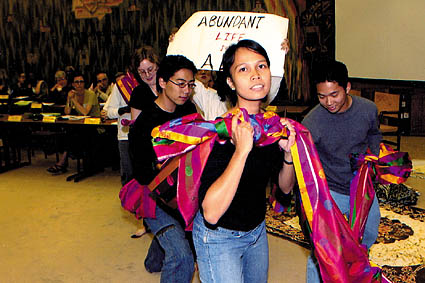 |
The
situation in Asia was the focus of a plenary at the recent (26 August
- 3 September) meeting of the WCC central committee. The plenary particularly
addressed inter-religious relations, conflicts and violence, and mission.
The central committee also approved a statement on South Asia as part
of its actions on Public Issues. |
Brazil
to host WCC's ninth assembly
Loud applause from
jubilant Latin American members of the World Council of Churches
(WCC) central committee met the announcement that the Council’s
next assembly (in 2006) will take place in Porto Alegre, Brazil.
Before making its
choice by written ballot vote on 2 September, committee members
heard strong arguments from other contenders – invitations
had been received from churches in Cyprus (Nicosia), South Korea
(Seoul), and the UK (Glasgow). The decision was based on a feasibility
assessment undertaken by Rev. Dr Gordon How.
Presenting Korea’s
bid to host the assembly, Prof. Dr Samuel Lee of the Presbyterian
Church of Korea cited his country as one of the best examples
of successful Christian mission, and promised that Korea’s
12 million Christians would be delighted to welcome the delegates
to Seoul. All eight churches composing the National Council of
Churches of Korea, including the Roman Catholic Church, had endorsed
the invitation, Lee reported. He noted that Korea is still divided,
and that a WCC assembly could have a positive impact on efforts
towards peace and reconciliation between North and South.
Pointing out that
Cyprus would offer an opportunity for the WCC to go to an Orthodox
country, Bishop Basilios Karayiannis of Trimithus from the Church
of Cyprus described his country as a bridge between Middle East
and Europe, and host to the Middle East Council of Churches.
The United Kingdom
representatives indicated that while they would be delighted to
host the assembly, they would support the invitations from the
other three sites.
According to Gordon
How, Porto Alegre had earned top marks on suitability of venue,
local support, availability of volunteers, and convenience of
travel and inter-city transit. It was also the least expensive
venue.
WCC
president Bishop Federico J. Pagura said Brazil would provide “a
platform for WCC to experience and send a message of hope to the world
on the wounds of the [free] market economy and new [trade] liberalism”.
He noted that in Brazil, a strong ecumenical movement embraces both Protestants
and Catholics, and that this will be the first-ever WCC assembly held
in Latin America and the Caribbean.

75th
anniversary of Faith and Order
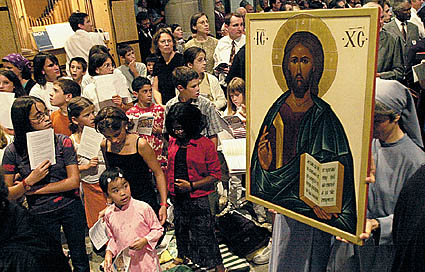
Ecumenical
service in the Lausanne cathedral celebrating Faith and Order's 75th
anniversary (25 August 2002). |
A
large group of international representatives from a wide spectrum
of church traditions gathered in Lausanne, Switzerland, on 25 August
2002 to celebrate 75 years of Faith and Order (F&O) work in search
of church unity at different levels. |
A number of those present were World Council of Churches (WCC) central
committee members attending a committee meeting in Geneva.
At an opening “convocation”, the younger generation, represented
by an intern with the F&O team, addressed the gathering. Anastasia
Vassiliadou, who studied theology at the university of Thessaloniki, Greece,
and also in the United States, received prolonged applause when she said
that youth “very much regret the almost complete lack of mutual
accountability among the still divided but ‘holy’ churches,
when society at large is forced by the ‘unholy’ mechanisms
of globalization to practically break down all dividing boundaries”.
“God wills unity, not for the sake of the church but for the sake
of the world, and we constantly pray to God: Your will be done,”
Vassiliadou affirmed. “The future of our little universe depends
on a reconciled world, a united Christianity.”
The celebration ended with an ecumenical service in Lausanne’s cathedral.
In his sermon, H.B. Archbishop Anastasios of Tirana, Durrës and All
Albania observed that “no one is ready to compromise on matters
of faith. However, in no way do we have the right to return to the fortress
of our past isolation.” He stressed that Christians “are called
to go beyond our closed communities, to transcend prejudices, hesitations
and fears, and to bear witness together to the risen Christ”.

Steps
to improve WCC finances
On
3 September 2002, the World Council of Churches (WCC) central committee
approved the appointment of a “task group”, comprised of four
of its members, to redress the organization’s financial situation.
According to a report from the WCC’s finance committee to the central
committee, the Council had a deficit of CHF 2.5 million as of 30 June
this year. The principal reasons, according to the report, were investment
and foreign currency losses totalling CHF 1.9 million. Contributions from
member churches and donor agencies have also dropped, due in part to the
depressed state of international financial markets and an ailing global
economy. At the same time, single-issue campaigns and civil society organizations
have begun effectively to compete with the WCC for support, public attention
and funding, including support by church-related agencies.
The situation, the central committee was told, calls for an immediate
reduction of expenditure in 2002 and further cutbacks in 2003. Accordingly,
the task group will recommend programme, activity and infrastructure changes
in the light of finances and programme priorities. These recommendations
will be acted upon by the WCC officers in mid-November.
“We are in a crisis,” observed WCC moderator, His Holiness
Aram I, Catholicos of Cilicia, during a central committee plenary debate.
“We all must struggle to look at the possibilities of increasing
income and decreasing expenditure. We should take this message to our
churches and our churches should respond to these challenges positively.”
Online
giving
To give online
or offline to WCC work on Africa, Israel/Palestine,
overcoming violence, globalization, talking with other faiths and/or
renovation of the Bossey Ecumenical Institute, visit
our website
Please give now! |

Recent
Resources
Simon Oxley
CREATIVE ECUMENICAL EDUCATION
Learning from One Another
Explores ways to encourage a creative informal approach to
ecumenical learning and includes practical ideas on how such
learning can be fostered in local congregations and church-related
groups.
156pp., Sfr.17.00, US$9.95, £6.95,
Euros 11.00
|
Konrad Raiser
FOR A CULTURE OF LIFE
Transforming Globalization and Violence
Examines the root causes and long-term implications
of international cooperation and cross-cultural hostility,
and argues for the creation of an “ecumenical space”
for dialogue and the building of community
182pp., Sfr.22.00, US$12.95, £8.95,
Euros 15.00
|
Reprinted!
Michael Kinnamon
and Brian E. Cope eds
THE ECUMENICAL MOVEMENT
An Anthology of Key Texts and Voices
Significant passages from the most widely influential texts
produced by assemblies, conferences and studies of the WCC
and similar bodies, covering faith and order, life and work,
and mission and evangelism. A resource for courses in ecumenism
in theological seminaries and faculties of religion, and a
reference guide.
562pp., Sfr.42.50, US$24.95, £16.95,
Euros 28.00
|
WHY VIOLENCE? WHY NOT
PEACE?
A study guide to help individuals and groups in
the churches reflect and act in the Decade to Overcome Violence.
24pp., single copies free upon request; 25 copies Sfr.
35.00, US$ 23.50, £15.00, Euros 23.50 including postage
- publications@wcc-coe.org
|
Jim Forest
THE RESURRECTION OF THE CHURCH IN ALBANIA
Voices of Orthodox Christians
The extraordinary story of the catacomb life of the church
in Albania, and the efforts of people who have contributed
to its resurrection, under the inspired leadership of Archbishop
Anastasios.
128pp., Sfr.26.00, US$15.95, £10.95,
Euros 17.00
|
|
|

Globalization
a danger, says WCC moderator
The
moderator of the World Council of Churches (WCC), His Holiness Aram I,
Catholicos of Cilicia, has warned that globalization “will sooner
or later become a dangerous space if it is not given a moral orientation
and spiritual sustenance”, and if it is not “transformed by
the ecumenical vision”.
Reporting on 26 August to the WCC central committee meeting in Geneva,
Aram I observed that, while globalization is creating a fenceless world,
many churches are building confessional fences as a way of self-affirmation.
“They are even afraid of ecumenism, considering it another expression
of globalization,” he said.
For the moderator, the destiny of the world “lies in diversity,
not homogenization, pluralism, not uniformity, wholeness, not disintegration,
coherence, not contradiction”. Being a church together “means
affirming our diversities” and “celebrating our common unity”.
On the same theme, WCC general secretary Rev. Dr Konrad Raiser observed
that ecumenism is presently confronting a very complex situation. “We
see an increase of denominationalism in all parts of the world, and a
tendency among churches to affirm particular identities and to strengthen
their institutional profiles.”
Raiser expressed concern that, following the September 11, 2001, terrorist
attacks in the United States, the debate on terrorism has divided the
churches, notably on whether and under what conditions to support military
interventions in the context of the “war on terrorism”.
He advised that, in seeking an alternative that can respond both to the
challenge of globalization and to the “culture of violence”,
the ecumenical movement needs to transcend the logic of power as domination.

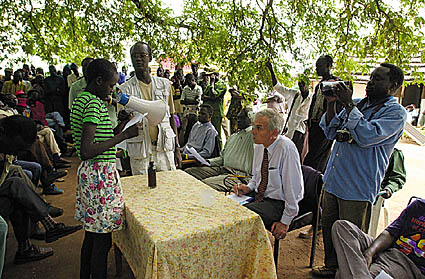 |
Boy's
moving testimony in Sudan's quest for peace
In
a moving testimony, a l3-year-old Sudanese boy summed up the desperate
quest for a lasting peace in his country, ruined by 19 years of civil
war. |
Abraham
Madol Aguk minced no words when he told visiting World Council of
Churches (WCC) general secretary Rev. Dr Konrad Raiser on 8 July
that “the president, Omar el Bashir, and his soldiers killed
my mother and my father three years ago, and now a church school
is my parent”.
Aguk said that many Sudanese children have been orphaned by the
war over the years, and were forced to witness the killing of parents
who attempted to shield them against bullet showers from helicopter
gunships.
In an appeal to the WCC, “we want you and the people of the
world to help us have our own peaceful country in southern Sudan,”
Aguk said.
Raiser’s pastoral visit to Sudan coincided with marathon ongoing
peace talks in Nairobi, Kenya. Many adult Sudanese, however, were
vividly aware that the only interlude of peace they ever experienced
was from 1972 to 1978, following the Addis Ababa peace agreement
brokered by the WCC and the All Africa Conference of Churches.
Led by Raiser, the WCC delegation visited southern Sudan’s
Upper Nile region – declared by the government as a “no-fly
zone”. The delegation later learned that a government helicopter
gunship had that morning conducted surveillance flights over the
villages before their arrival. “You took a great risk to demonstrate
solidarity with us,” commented the executive director of the
New Sudan Council of Churches, Dr Harun Runn.
Addressing a public gathering, Raiser stressed that Sudan should
seek “peace of and for the people and not for the powerful.
A peace agreement that will last is one owned by the people.”
“The powerful”, he added, “tend to seek peace
to dominate, and even though their people may be in relative peace,
that would be peace of the fearful. True peace is rooted in justice.
It has to be peace of those who are not afraid and who, therefore,
have hope to last beyond the present.”
The WCC visit to Sudan was part of a broader tour to the Horn of
Africa, 1-16 July 2002. Before arriving in Sudan, Raiser visited
Tanzania. During a brief consultation with the Tanzanian prime minister,
Frederick Sumaye, the latter recalled that the WCC had been “a
dependable partner of Africa during the decolonization era”,
and went on to call on churches to help in poverty alleviation.
In response, Raiser stressed the importance of mobilizing people’s
potentials for development. He pointed out that the church, being
“present at the grassroots” and “close to their
condition and expectations”, could help translate Africa’s
New Partnership for Development into the language of the people.
(NEPAD is a new development body that seeks to promote better understanding
between Africa and the wealthy nations in order to spur Africa’s
development.)
From Sudan, Raiser went on to Ethiopia. In a meeting on 11 July
with the Ethiopian president Girima W. Giorgis, the latter expressed
great admiration for religious leaders – for their role in
restoring peace between his country and Eritrea, and their contribution
to the war against HIV/AIDS. |

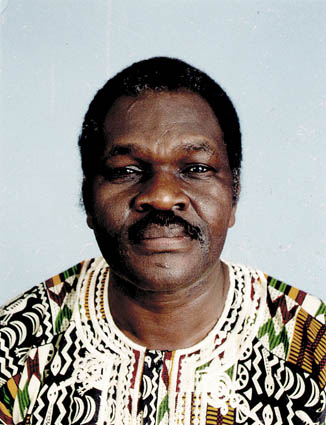
The
guest editor for this issue of WCC News is Mitch Odero. He is a consultant
information officer at the All Africa Conference of Churches, based
in Nairobi, Kenya. He is also the acting director and editor of the
All Africa News Agency, a pan-African ecumenical news and features
service. |
WCC
News is published four times a year and distributed free of
charge.
However, if you wish to make a contribution (the equivalent of US$20
minimum),
payable by cheque made out to "WCC" or Visa or Mastercard,
this would be welcome. Please indicate "For WCCNews"
Produced by:
WCC Public Information
Team
Managing
editor:
Kristine Greenaway
For further information write to:
WCC NEWS
WCC Communication
P. O. Box 2100
1211 Geneva 2
Switzerland
Telephone: (41-22) 791 6111
General Fax: (41-22) 791 0361
E-mail for enquiries: bob@wcc-coe.org
WCC Communication fax: (41 22) 798 1346
World Wide Web:
http://www.wcc-coe.org
Please feel free to reproduce this material and pass it on,
acknowledging the source
Design:
Marie Arnaud Snakkers
Pr inted in Switzerland
©WCC
Original: English |
©
2002 world council of churches | remarks to
webeditor@mail.wcc-coe.org
